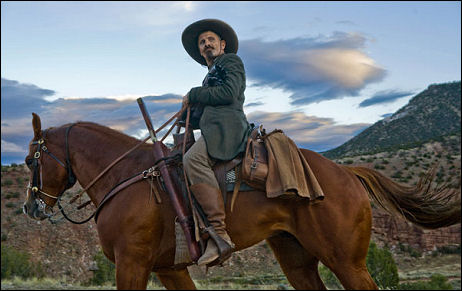
So, the first part of Appaloosa is boring. Cole (Ed Harris. less wild-eyed than Walker) and Hitch (Viggo Mortensen, borrowing Doc Holiday’s facial hair) are the good guys, Bragg (Jeremy Irons) is the bad guy, Ms. French (Renee Zellweger) is the “widow.” Normal cowboy movie things happen.

Cole says stoic cowboy things to the bad guys and (almost) tender things to good girl Ms. French. The town of Appaloosa is every Western town (there isn’t even a preponderance of appaloosas). Bragg is brought to justice surprisingly early in the film, and on the train to his hanging we want to know what is going to fill the next hour. On a cliff overlooking the train tracks, a puma appears and brings with it the wildness the film needs.

A pair of hombres damn near as tough as Cole and Hitch have abducted Ms. French and, of course, then want Bragg in exchange for her life. We know she’s not worth it. She kissed Hitch behind Cole’s back. But Cole agrees to free Bragg and is next seen sitting with his boots off before a lovely, trickling creek—he has ceded authority. But Hitch revives him and they go chase down Bragg and Ms. French and the hombres.
When the good guys catch up to them, they spy Ms. French acting over-friendly with Bragg in a riverbed. There are grimaces and, crucially, some Apaches come from nowhere and intercede—the power dynamics shift again. Hitch shares an interesting bit of pre-feminist philosophy when he explains that Ms. French always needs to be with “the top hand,” thus explaining her cavorting with Bragg. The triangulation of Hitch, Cole, and Ms. French in physical and psychological space is fascinating, and here I would agree with A.O. Scott who admired many of the ideas in Appaloosa but wishes Harris had pushed things further. Hitch and Ms. French both love Cole but must also wander off and come back to him. It is this undercurrent that makes the subplot perhaps more gripping than the standard cowboy narrative over top it.

All of this happens in beautifully photographed New Mexico. The camera emphasizes bright sunlight on tree, sand and rock as well as moonlight that dramatically edges the characters at night. A climax of sorts happens at the Mexican border town of Rio Seco, a place where you might expect to find the Wild Bunch: white washed, dusty and quiet except for the invisible tolling of church bells.

Some criticism of the film talked about the length of many shots, and this is certainly a lingering movie. But I’m a fan of the lingering Western, having a particular affinity for the fabled four hour cut of All the Pretty Horses. Some of Cole and Hitch’s chats border on banal (I blame their subject matter, Thoreau and Emerson, for some of the boredom), but it probably got pretty damn boring when you were out on the range waiting for people to come shoot at you.
And the shootouts in Appaloosa, from the first scene to the last, are quick affairs. Cole addresses this phenomenon in my favorite line of the film. Lying on the ground, wounded, Hitch says, “that was quick,” to which Cole, also lying on the ground, also wounded, replies, “yeah, everybody could shoot.” The violence is short and loud the days are long and quiet.
Somehow, Bragg rides out the Rio Seco shootout and lands on his feet back in town, having received a dubious pardon from President Chet Arthur. So we move into a most unusual end for a Western. Hitch and Cole are forced to deal with a rehabilitated Bragg (who places his hand oh-so-subtly on the back of the new piano player at his hotel, Ms. French). Hitch wants out, Cole (perhaps feeling his age for the first time) won’t be run off. This falling action is the most obvious comment on our times: we're inextricably drawn into collusion with government-backed criminals for the continuing assurance of our money and comfort.
Hitch swiftly scratches his itch and hustles West, towards the sun still setting.

I credit Harris the director for giving us a Western milieu as tangible as the action painting in his other feature, Pollock. The setting and story feel true and even though there is no Wayne and Mitchum/Martin/Clift, Harris and Mortensen are engaging all the way through. And, let it be known, that Appaloosa is much better than Open Range to which it is compared, I suppose, because they both came out in the last six years.


No comments:
Post a Comment